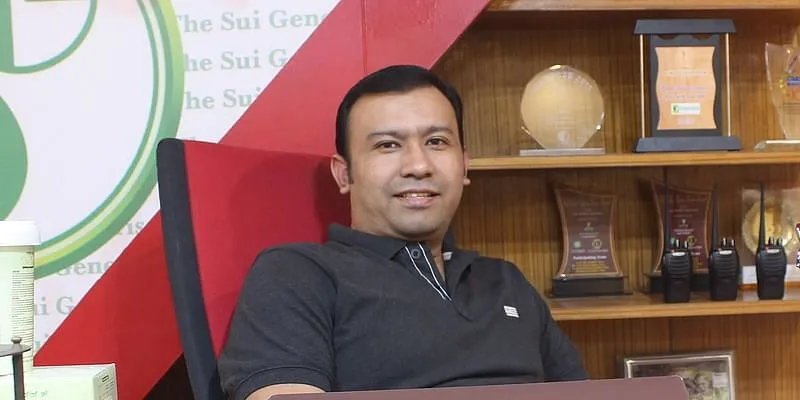How Tier-II entrepreneurs built businesses clocking crores and other top stories of the week
This week’s top picks from SMBStory includes the stories of brothers Jai and Anuj Agarwal, who built a Rs 908 crore dairy business in Lucknow, and Udaipur-based Murdia family who built one of India’s leading IVF chains.
Indian businesses have, time and again, proven that it doesn’t matter where you come from, what matters is your desire to disrupt and advance.
Read on this week’s top picks- the story of Lucknow-based dairy company and one of India’s leading IVF chains, Udaipur-based Indira IVF.
Gyan Dairy

Jai Agarwal and Anuj Agarwal, Founders of Gyan Dairy
Jai Agarwal was running a family tobacco business in Lucknow when in 2005, his brother Anuj Agarwal decided to join him. However, with no possible avenues for disruption in the tobacco business, the brothers decided to explore new opportunities.
“We were living in a semi-rural area. A tobacco business doesn’t need too much hard work or infrastructure. Additionally, there was no professional or social growth there. We were these entitled kids living comfortably. When my brother realised there wasn’t much for him to contribute, we started brainstorming for new ideas,” Jai Agarwal tells SMBStory.
For a few years, the brothers dabbled in real estate but nothing materialised. But an old real estate investment changed gears for them.
The brother-duo decided to renovate and reset a shutdown dairy unit bought a few years ago and launched Gyan Dairy in 2007. The Lucknow-headquartered company started manufacturing dairy products, including milk, curd, chaach (buttermilk), paneer (cottage cheese), and butter, among others.
At present, it manufactures and sells 27 dairy products across Uttar Pradesh. The Lucknow-based company recently onboarded actor Manoj Bajpai to promote the brand’s launch in Kanpur. The brand also operates exclusive retail outlets called Gyan Fresh Stores, spread across 53 locations in the northern state.
Last year, the dairy brand clocked a turnover of Rs 908 crore.
Indira IVF

L-R: Dr Kshitiz Murdia, Dr Ajay Murdia, and Dr Nitiz Murdia
In 1988, fertility specialist Dr Ajay Murdia started a fertility clinic with Rs 5,000 in his pocket in Udaipur, Rajasthan, to provide personalised assisted reproductive technology (ART) treatment, as well as to make people understand that men, too, are responsible for infertility, and should get tested along with women.
Around the same time, he opened one of India’s first sperm banks in Udaipur and trained doctors from across the country. As medical sciences advanced and newer technologies were adapted, Ajay’s two sons — Dr Kshitiz Murdia and Nitiz Murdia — brought these services under the Indira IVF banner.
Dr Kshitiz Murdia, CEO of Indira IVF, tells SMBStory, “When my father started a fertility clinic, he was not much welcomed by society. The issue of speaking about male infertility was a taboo. But things changed as he counselled and treated people, and, in turn, parents witnessed the positive results.”
Growing from just two fertility clinics in 2015 (Udaipur and Pune) to 93 centres in 2020, Indira IVF has a presence across India. Indira IVF uses various technologies like RI witness™ technology, closed working chambers technology, artificial intelligence (AI), and microfluidics, among others to help its patients.
At present, Indira IVF is among India’s leading IVF chains, clocking Rs 850 crore turnover.
Other top stories of the week
CC Tea

Ragesh Keisham, Founder, CC Tea
In 2008, Imphal-based Ragesh Keisham’s family was crushed under a mountain of debt and had to sell-off nearly everything to treat his adopted sister. However, she eventually lost her battle to leukaemia.
With the Manipuri family living hand-to-mouth, Ragesh needed to find a way out. He tried his hands at various businesses, including data digitisation and supplying bamboo saplings to Uttarakhand, but with no success.
He needed a venture that would generate significant income. But any business that would require electricity was out of the question since it was available for only three to four hours a day in the region. The only possible outlet Ragesh saw was agriculture.
It was under these dire circumstances that he came up with an out-of-the-box idea to make tea out of lemongrass. In 2011, he launched the CC Tea brand under the parent company SuiGeneris Agronomy, which he set up in 2010.
“I made 200 packets of the tea myself and launched CC Tea. Within five minutes, all 200 packets were sold locally. Our initial investment was around Rs 5 lakh. Today, with the popularity of our lemongrass tea, the brand has grown and recorded Rs 8 crore turnover in 2019-20,” he says in an interview with SMBStory.
CC Tea’s parent company SuiGeneris owns and manages 350 acres of lemongrass fields in Imphal. It has acquired an additional 500 acres for cultivation, and at present, is expanding production to meet the growing demand for CC Tea.
In 2017, the business received an investment of nearly $550,000 from The Netherlands-based fund C4D Partners. Now, it plans to raise another round of funding to launch a second factory in Nongpok Sekmai village, which is about 30 km from Imphal.
The entrepreneur also brings up how resilient CC Tea was during the COVID-19 pandemic. Despite taking a hit and shutting its factory for six months, the business did not lay off anybody, he claims. “The staff of the company proved their loyalty by earning a reduced salary for many months and kept us afloat,” he says.
Edited by Saheli Sen Gupta









